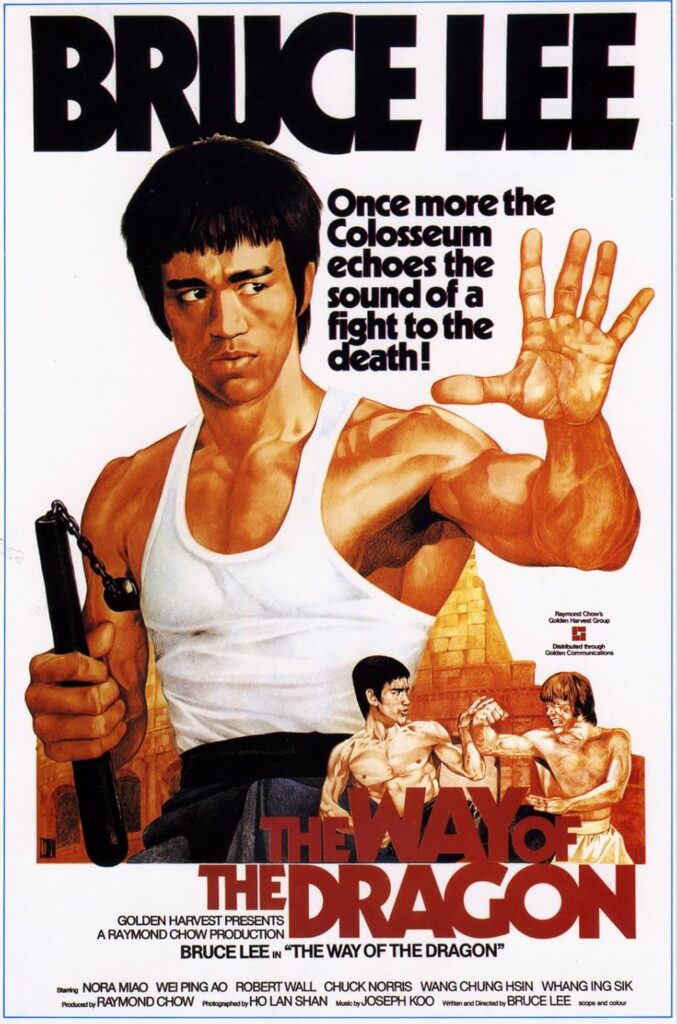
Way of the Dragon (1972) Plot Summary
A quiet man travels to Rome to defend a family restaurant from gangsters. His unique martial arts style becomes their salvation in a city unprepared for his strength and spirit.

Arrival in Rome
In the heart of Rome, a local Chinese restaurant faced mounting pressure from a criminal syndicate led by a powerful mob boss. The establishment, run by Chen Ching-hua and her uncle Wang, was a source of pride and community for the Chinese expatriates, but it stood on prime real estate coveted by gangsters. When Chen refused to surrender her family’s livelihood, threats escalated. Thugs were dispatched to harass customers and disrupt the daily operations, hoping to force the restaurant into closure.
In response, a plea for assistance was sent to Hong Kong. The answer arrived in the form of Tang Lung, a seemingly unassuming martial artist unfamiliar with the West. Tang’s first steps into Rome revealed his discomfort and naivety, prompting skepticism from Chen and the restaurant staff. Dressed plainly and lacking urban sophistication, he was mistaken for a country bumpkin. Despite the cold reception, Tang expressed quiet confidence, assuring Chen that his abilities would soon prove useful.
Proving His Worth
At the restaurant, tensions simmered. The staff had begun training in karate to defend themselves, causing friction with Quen, who remained loyal to traditional kung fu. Tang offered sage advice: practicality should outweigh pride in any martial art.
Soon after, a group of gangsters stormed the restaurant. While Tang was indisposed in the restroom, the staff attempted to resist but were swiftly overpowered. Disappointment in Tang’s apparent ineffectiveness spread. However, when the gang returned days later, Tang sprang into action. In a stunning solo effort, he defeated the attackers with precision and power. The staff, newly inspired, asked Tang to train them. Uncle Wang, wary of retaliation, warned that the gang would not take their defeat lightly. Tang, undeterred, vowed to stay and protect the business.
Chen and Tang’s bond deepened during a tour of Rome. Though Tang found little charm in the city’s architecture, the time spent together forged a connection. But their reprieve was short-lived.
Escalation and Betrayal
Gang lieutenant Ho returned with armed men and issued a final warning. Tang was given a plane ticket back to Hong Kong. When he refused and was escorted outside, Tang retaliated with his signature twin nunchaku. The attackers were repelled, and Ho fled.
Despite another brief celebration, threats persisted. With the Lunar New Year approaching, pressure mounted. One evening, a sniper attempted to assassinate Tang under the cover of fireworks. He narrowly escaped, tracking and defeating the would-be killer. When he returned, Chen was missing. Suspecting foul play, Tang led the staff in storming the gang’s headquarters, where they overpowered Ho’s men.
A telegram from Hong Kong arrived, summoning Tang back home. He reassured the staff that he would not leave until the matter was settled permanently.
The Final Duel
The gang escalated their efforts by hiring foreign fighters: two seasoned karate masters and a fearsome martial artist named Colt. Under the guise of negotiation, Ho led members of the restaurant staff to a remote site where the hired assassins lay in wait. A brutal ambush ensued. As the staff fell, Tang appeared and intervened. He dispatched the attackers before Ho lured him to the Colosseum for a final showdown.
There, Tang faced Colt in a tense, drawn-out battle of speed, power, and discipline. Despite Colt’s formidable technique, Tang gained the upper hand. Offered a chance at mercy, Colt refused, forcing Tang to strike a fatal blow.
Back at the ambush site, treachery unfolded. Uncle Wang, revealed to have conspired with the mob boss, murdered the last remaining staff members. His motive: to sell the restaurant and secure wealth. As Tang returned with Ho, the mob boss appeared, shooting both Ho and Wang to tie up loose ends.
Police arrived in time, led by Chen. The crime lord was arrested while attempting to kill Tang. With justice restored, Tang prepared to return to Hong Kong. Watching him depart, Quen told Chen that Tang was destined to walk his path alone, never lingering long in one place.
Conclusion
The conflict in Rome was resolved through loyalty, sacrifice, and courage. Tang Lung’s journey not only saved a community but exposed the resilience of cultural identity in the face of corruption. His departure marked not the end, but a quiet continuation of a warrior’s path—guided by principle and bound by honor.


